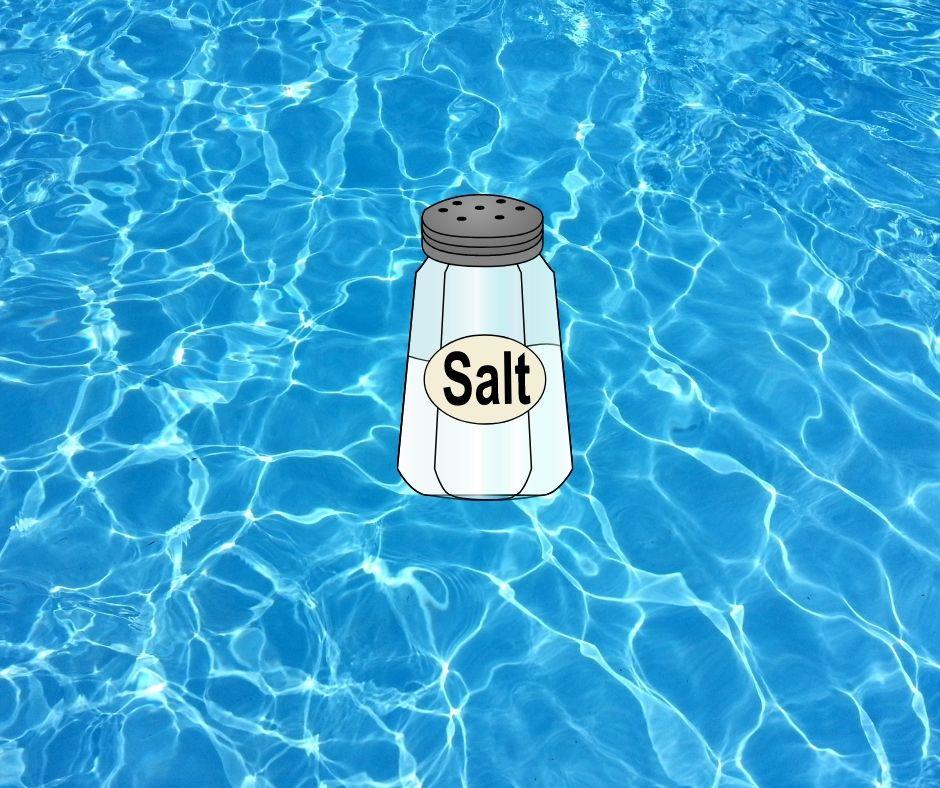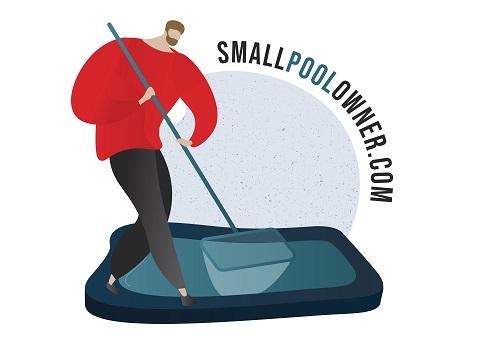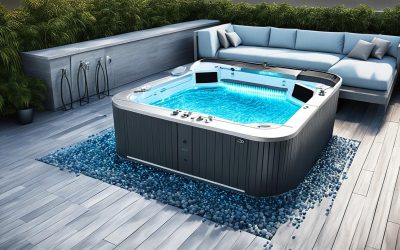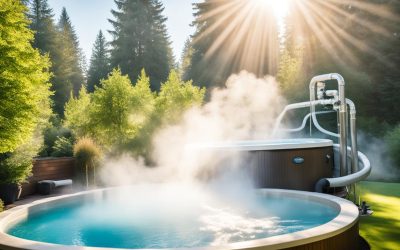
In this article, we will examine why you should consider a saltwater pool, the steps to convert your above ground pool into a saltwater pool, the benefits and obstacles thereof.
Yes, it is a mouthful, so let’s get started.
Why consider an above ground saltwater pool?
Saltwater pools are becoming more and more popular.
They are environmentally friendly, safe for everyone to swim in, and they can help you save money on maintenance costs!
If you’re considering converting or starting an above ground saltwater pool but don’t know all the benefits of it, then we hopefully have all the answers for you.
First off, let’s look at the standard Chlorine Pools.
*Chlorine: Chlorine has been used since 1894 when it was first discovered by German chemist Dr. Carl Lindner during his experiments with hydrochloric acid and chlorine gas which was a by-product of a chemical manufacturing process.
The usage of chlorine has been increased since then as it is considered to be the most effective sanitizer for swimming pools and water treatment plants.
Chlorine is used to treat drinking water, wastewater, and swimming pools because it does not leave any harmful residue behind after reacting with contaminants in the pool.
In fact, when combined with other chemicals such as cyanuric acid or iodine, chlorine becomes even more powerful at eradicating bacteria and algae from your pool water.
Although it remains an effective way to keep your pool clean, there are some drawbacks that come with using chlorine:
- It can cause serious eye irritation if you get too close to the water.
- It leaves behind harmful residue on your skin and hair which can cause an allergic reaction in some individuals.
- Chlorine can be harmful if inhaled and can even lead to death if swallowed.
In contrast, saltwater pools combine the benefits of saltwater and chlorine into one powerful combination!
Of course, they don’t contain any chlorine at all so you won’t have to worry about any of the side effects of chlorine listed above.
They are also very environmentally friendly which is a good option for families who have younger children because they don’t pose any health risks to the swimmers or those handling them. Saltwater pools will sanitize and purify your pool using algae, anaerobic bacteria, and sunlight instead of harmful chemicals.
To Summarise the benefits of saltwater above ground pool system.
- Saltwater pools are environmentally friendly
- They don’t contain any chlorine at all so you won’t have to worry about any of the side effects of chlorine listed above
- Saltwater pools will sanitize and purify your pool using algae, anaerobic bacteria, and sunlight instead of harmful chemicals
- It is far more cost-effective than using chemicals
Salt Water Pools: How Do They Work?
The saltwater system in saltwater pools is designed to maintain the right amount of salt at all times in order to keep the mixture balanced and prevent corrosive elements from building up over time.
This is achieved by turning the chemical compound of your pool (check out steps later in this article) to a salt base and then adding a saltwater chlorinator system.
Most saltwater pools need to be refilled with around 200 pounds of salt every 6 months. This should balance out the amount of chlorine that is used on a regular basis in order to keep your pool clean and clear.
With above ground pools, these numbers should be adjusted based on water volume. Chat to your local pool company for guidance.
Tip: Most pool owners prefer to use rainwater for cleaning pools because it offers an eco-friendly method of maintaining the salt levels in your pool without using any harmful chemicals or consuming large amounts of water from a local supply.
The negatives of a saltwater above ground pool
It is al great and wonderful that you want to convert your existing chlorine pool into a saltwater system.
But unfortunately, this can come at a cost.
See, salt is not meant to mix with metal. So, if your existing above ground pool is made out of metal then depending on the rust protection of the pool, the salt will start eroding the metal.
In short, this can greatly reduce the number of years your above ground pool will last.
(We discussed how long in general above ground pools last in this article Above Ground Pools Last Longer Than You Think – so click the link if you want to have a definite answer.
The best types of above ground pools to consider for a saltwater conversion are pools with a plastic or aluminum structure.
Steps to convert your above ground pool to a saltwater system
Okay so now we looked at all the pros and cons of a saltwater system for your above ground pool. Let’s dig into how you go about doing it.
Word of caution if you are not a DIY type of person, then perhaps ask your local pool shop for assistance. Otherwise without further ado here is the steps in converting your above ground pool into a saltwater system”
Step 1 – Test existing pool water chemical balance
Even if you decide to drain your pool and fill it up again, the chemical levels in your above ground pool needs to be tested and balanced where necessary. .
Contact a pool professional or use a home kit available on Amazon
(all products available at Amazon – see Product resources at the bottom of this article)
The following is the list of items chemicals needed to be tested for your above ground pool or any pool for that matter before you do a saltwater conversion. Also included in the table is what the optimum range is and also the chemicals or method needed to balance the chemicals
| Chemical | Optimum Range | How to Ballance |
| Alkalinity | 80-120 ppm | If too Low – substitute with sodium bicarbonate If to High – Muriatic Accid |
| pH | Between 7.2 -7.6 | If to Low – Use a pH increaser If to High – Muriatic Accid |
| Free Chlorine | 1-3 ppm | If to Low – Ad Rapid Pool Shock If to High – Drain 2-3 inches and add fresh water |
| Cyanuric Acid | 50-80 ppm | If to Low – Ad Pool Stabilizer If to High – Drain 2-3 inches and add fresh water |
| Calcium Hardness | 200-400 ppm | If to Low – Ad Calcium Hardness If to High – Drain 2-3 inches and add fresh water |
| Metals* | None | Use metal control to lower metals in your pool |
- Metals* – There should be no metals in the water. Metals can cause staining of the pool surface.
Note: An existing pool may have salt levels if liquid chlorine has been used.
Step 2 – Add Salt to Your Above Ground Pool
Once the water balance of your pool is correct you can add salt. The average salt level should be 2700 to 3500 ppm. Most Important: Only use sodium chloride that is greater than 99% pure.
Do not use:
- Rock Salt
- Yellow Prussiate of Soda
- Salt with anti-caking additives
- Iodised salt
Step 3 – Install the chlorinator system
Once the first two steps are completed, install and then turn on your saltwater chlorinator system.
Your what?
Yes, in order o permanently change your pool to a saltwater pool you would need a chlorinator system.
In short, the salty water you have just created in step 2, will go into the chlorinator, from where it will produce chlorinated water, going back into your pool.
The chlorinated water does its work in the pool then combines again with sodium chloride and becomes salt again and that water goes back into the chlorinator system, completing the loop.
It goes without saying that you would need a pool pump in order to pump the water into the system and out again. This video explains the process in more detail:
You can purchase a simple install system from Intex here. Further, watch this video for more information.
And that is the process of changing your pool into saltwater.
If you are unsure of any of the steps, contact your local pool shop for assistance.
Related Questions
How regularly should I add Salt to my above ground saltwater pool?
In general, there is no timeframe when you need to add salt to your above ground pool. The only time when new salt is needed is when your pool gets diluted by either rain or draining your pool and adding fresh water. Should you add new salt, ensure you measure your water to determine the exact amount of new salt needed.
How long does a chlorinator system last for an above ground pool?
There are two components to the chlorinator system that can influence the lifespan of the generator. Firstly, there is the Cell, and secondly the control board. The cell typically can last between 3 to 7 years for your above ground pool. The lifespan of the cell is dependant on how often it is cleaned as well as the chemical level that gets too high. As for the control board, since it is in essence a circuit board there is not a definitive lifespan, although it should last you at least 5 years on average.
How long should I run my above ground saltwater system?
Since the pool pump is required for the chlorinator system, the length of time running your saltwater system depends on the manufacturer’s recommendation of running the above ground pool pump. In general, for above ground pools this is normally around 4 hours a day.
Key Takeaways
If you are considering transforming your current above ground pool into a saltwater pool here are the key takeaways
- Clearly identify the reasons you want to do this.
- Establish if your above ground pool is able to handle a saltwater system
- Caluclated the investiment needed for
- The chemical tests and possble corrective measures
- The Chlorinator system
- Determine if this will be a DIY prosess or if you are going at it yourself
That is basically it. To conclude this is one of those topics dependant on your own preference.
Above Ground Pool Saltwater Conversion Product Resources
The following products have been discussed in this article all available on Amazon
Above Ground Pool Saltwater Chlorinator System – to set up and implement your Above Ground pool saltwater conversion
sodium bicarbonate – to increase your pools alkalinity levels
Muriatic Accid – to decrease your pool’s alkalinity level and to decrease the pH level
pH increaser – as the name suggests this will increase your pool’s pH level
Rapid Pool Shock – to increase your pool’s Free Chlorine level
Pool Stabilizer – to increase the Cyanuric Acid level
Calcium Hardness – to increase calcium hardness levels






0 Comments